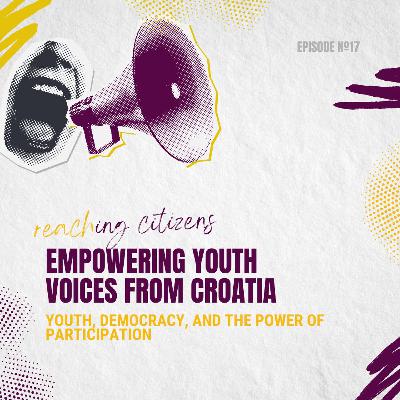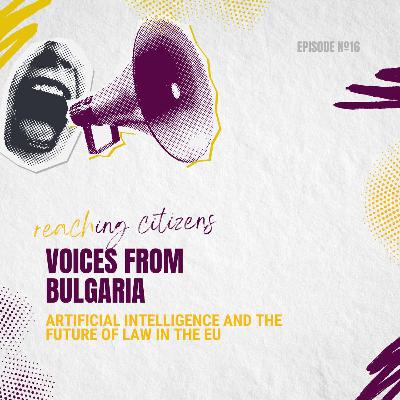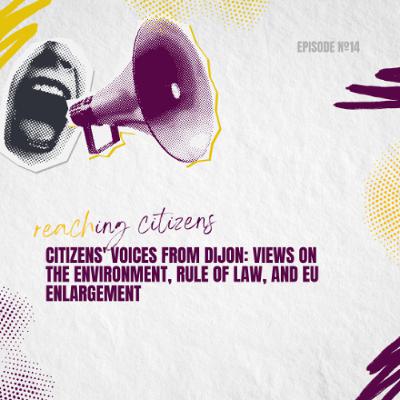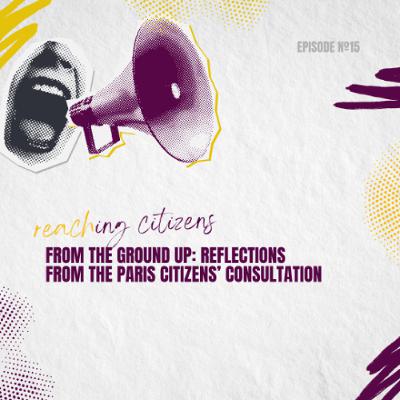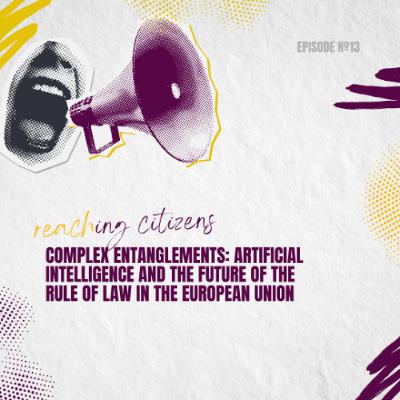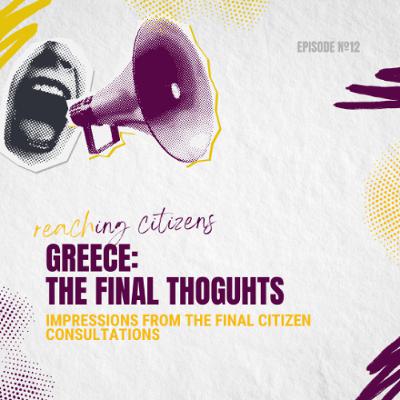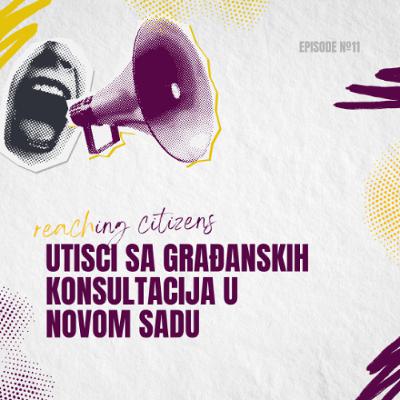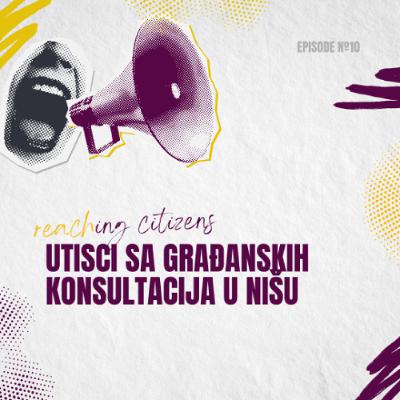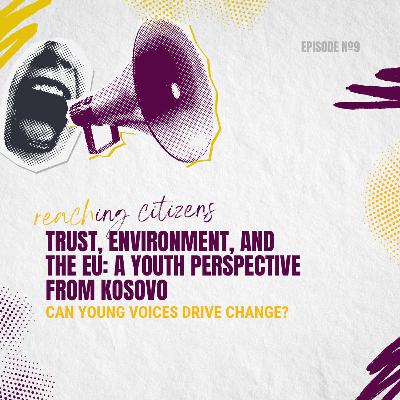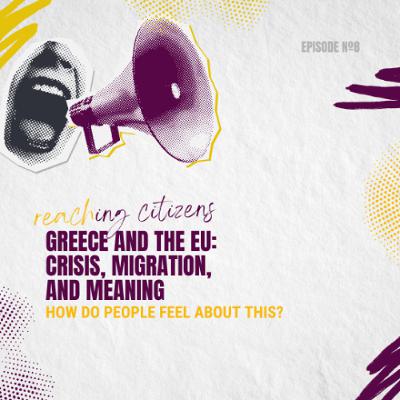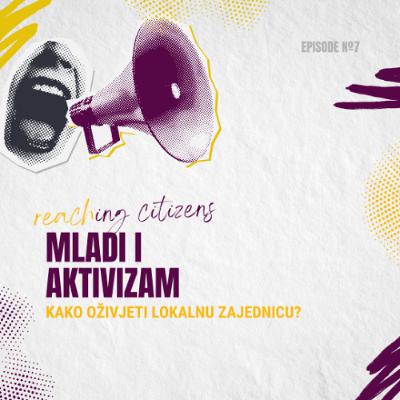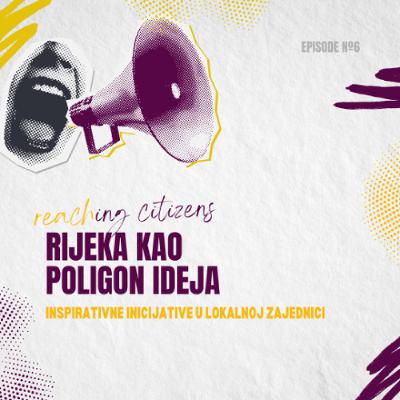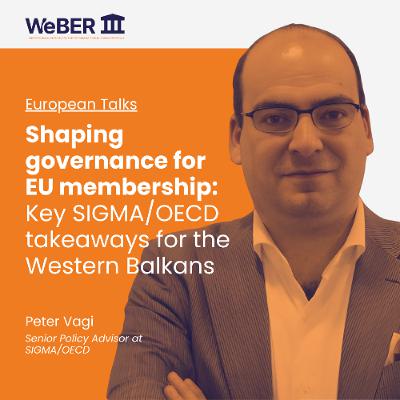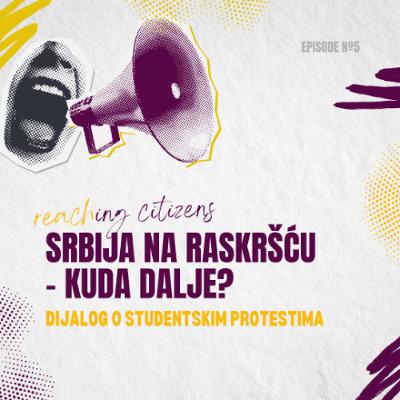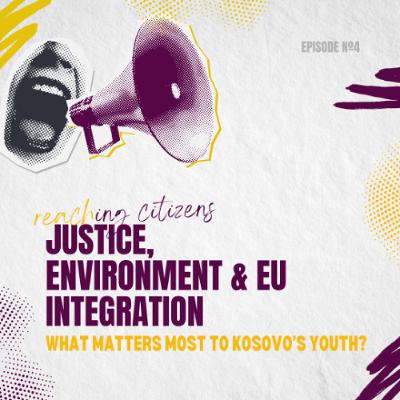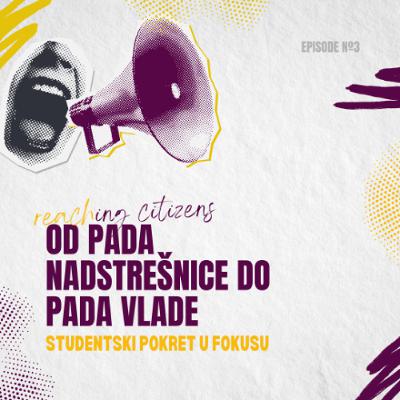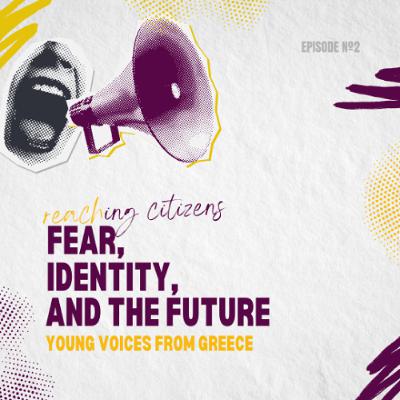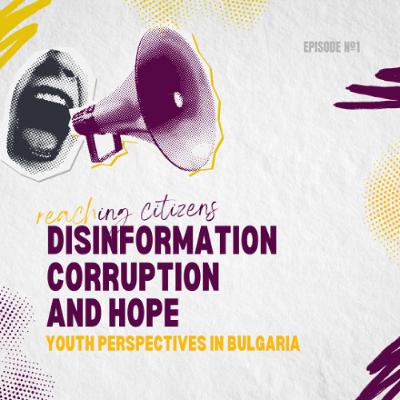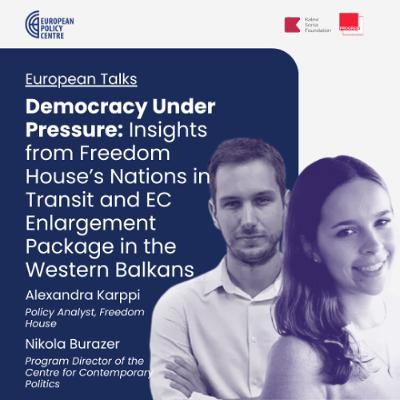Discover European Talks
European Talks

European Talks
Author: European Talks
Subscribed: 14Played: 192Subscribe
Share
© All rights reserved
Description
European Talks podcast is a short form conversation that aims to untangle difficult questions on various topics related to Serbia’s relations with the EU and its member states, by talking to experts, diplomats, and other relevant actors. Whether you are a researcher, a politician, or just genuinely curious about the topic, European Talks podcast will provide you with valuable ideas, answers as well as new questions.
The producer is European Policy Centre - CEP, non-governmental, non-profit, independent think tank based in Belgrade.
The producer is European Policy Centre - CEP, non-governmental, non-profit, independent think tank based in Belgrade.
96 Episodes
Reverse
In the new episode of the #REACHingCitizens podcast, we talk with Andro Demiri, a law student and young activist from Rijeka, who took part in a local consultation in Rijeka and a national consultation in Zagreb as part of the REACH project.
Andro shares what motivated him to participate, how he experienced the discussions on the rule of law, the environment, and the European Union, and how he views the potential of mandatory voting as a way to increase citizens' political participation.
He places special emphasis on the role of young people in democratic processes, the importance of civic education and engagement, and the challenges youth face today – from apathy to a lack of opportunities – while also highlighting Rijeka as a community that offers many opportunities for young people.
Through his own experience in the European Youth Parliament of Croatia and his collaboration with numerous organizations, Andro shares insights into how participation can become a part of everyday community life.
In this episode of our #REACHingCitizens podcast we are talking to Vladimir Krasenov, a legal advisor in a local law firm in Bulgaria. Through our talk, we explore the effects of AI on the current political situation, as well as discussing what the future of law in the European Union.
In this episode, we dive back into the local consultation of the Reinventing Engagement through Citizens’ Consultations (REACH) project, held in Dijon on January 25th. Our conversation brings together two participants of this consulation, Gaëlle Boucher, a teacher in Dijon, and Roman Sobine, a student at the Dijon campus of SciencesPo, with whom we reflected on the consultation, on the recommendations that emerged from the discussions, and on the vision French people have on the environment, the rule of law, and the enlargement of the EU. This initiative, led by CEP, aims at strengthening the voice of citizens in the European decision-making process, both within the EU and in candidate countries.
In this episode, we dive back into the local consultation of the Reinventing Engagement through Citizens’ Consultations (REACH) project, held in Paris on March 3rd. Our conversation brings together two insightful participants, Anne-Sophie de Quercize, a former teacher specialising in the history of religions and Jules Paindessous, a young project engineer, with whom we reflected on the consultation: how it unfolded, the key themes discussed—environment, the rule of law, and EU enlargement—and the recommendations formulated by citizens. This initiative, led by CEP, aims at strengthening the voice of citizens in the European decision-making process, both within the EU and in candidate countries.
Welcome to our podcast series, REACHing Citizens, part of the “Reshaping Engagement through Affirmative Citizen Consultations (REACH)” project. Launched in 2024 and funded by the European Education, Audiovisual and Culture Executive Agency (EACEA), the REACH project brings together organisations from across Europe, including Serbia, Belgium, Kosovo, BiH, Bulgaria, France, Croatia, and Greece.
In this episode, we welcome Vladimir Krasenov, a young Bulgarian legal advisor with a strong interest in the European Union (EU) and its legal system. Vladimir became involved with the REACH project after attending a local citizen consultation in Plovdiv, Bulgaria, in November 2024. He also contributed an article to the Mladirini youth portal titled “The rule of law and the U.S. elections: The influence of perspectives as a premise of people’s decisions.”
In the podcast, Vladimir explores recent developments in artificial intelligence (AI) and their implications for the rule of law in the EU, with a focus on Bulgaria. He discusses core legal principles such as respect for human rights, regulatory enforcement, transparency, and fairness in the application of law.
Vladimir begins by examining how AI is transforming society, particularly in education and business. While these changes offer significant benefits, they also pose major risks. In the legal field, AI enhances efficiency—streamlining legal research, improving contract analysis, detecting infringements, and reducing fraud. Yet serious concerns remain, especially around lack of transparency, difficulty verifying algorithmic impartiality, and risks of bias in automated decision-making.
The conversation then shifts to the role of the EU and other global players in shaping and regulating AI. Vladimir highlights the significance of the AI Act, approved by the European Parliament in 2024. This legislation marks a major step in safeguarding citizens from AI-related risks. It categorises AI systems by risk level, with those posing an “unacceptable risk” (i.e. violating fundamental rights) subject to strict limitations. The Act also addresses privacy protection and copyright concerns.
However, Vladimir notes the challenges the EU faces in competing with global tech powers like the US and China. While the US dominates with firms like OpenAI and Google, China invests heavily in AI giants such as DeepSeek. These countries are in a race to advance AI capabilities, often pushing the boundaries of regulation. The US lacks comprehensive ethical guidelines, while China’s approach raises serious privacy issues, particularly through biometric surveillance technologies used for state control. These tools collect and analyse facial data on a massive scale, yet the storage, use, and oversight of this data remain opaque.
Vladimir warns that adopting such technologies in Europe could severely undermine privacy rights, especially for vulnerable populations such as refugees and asylum seekers. Without robust legal safeguards, AI could threaten the foundational values of the EU.
To realise AI’s potential while mitigating its risks, Vladimir stresses the importance of public awareness and engagement. European citizens and policymakers must stay informed and actively participate in discussions on AI. Ethical, transparent, and rights-respecting AI development is crucial. According to Vladimir, the guiding principles must be transparency, fairness, and accountability.
In this episode of the #REACHingCitizens podcast, we talk about the impressions from our final citizen consultations in Greece.
What can we expect in the future, what are the final thoughts?
U jedanaestoj epizodi "REACHing citizens" podkasta razgovaramo sa Jelenom Mihajlović o stavu omladine prema EU integracijama, aktuelnim problemima i potencijalnim rešenjima za trenutno nepoverenje u državne institucije.
U ovoj podkast epizodi, desetoj epizodi u našem "REACHing Citizens" podkastu, razgovaramo sa učesnicom lokalnih građanskih konsultacija u Nišu, Marijom Ružić, o utiscima i stavu građana prema EU i njihovom stavu prema temama poput dobre vladavine, ekologije i EU integracija.
In this episode, we sit down with two participants from our local consultation in Gjakova to reflect on youth perspectives in Kosovo. They share candid thoughts on the rule of law, EU integration, and environmental issues—highlighting both hope and frustration. From mistrust in the justice system to the promise of renewable energy, we explore how young people see Kosovo’s future and their role in shaping it.
This episode was filmed in Albanian.
Link for the English transcript: https://acrobat.adobe.com/id/urn:aaid:sc:EU:5e63cf14-996f-4eca-bfbc-8d9b82d3d497
Our guest is Ornela Sollakou, one of the participants from our second event in Thessaloniki. We discuss tensions surrounding the 2018 Prespa Agreement, the migration crisis and the integration of migrants in Greek society, and finally how the EU has come to mean something abstract and bureaucratic to citizens.
Ornela shares her thoughts on why these things came up in the event and why people felt strongly about them. She also relays when she felt disappointed by opinions expressed and when she related to others.
U ovoj epizodi podcasta "Reaching Citizens" gostuje Gea Rajić, mlada dizajnerica i aktivistica iz Pazina, koja govori o svom sudjelovanju u građanskom savjetovanju u sklopu projekta REACH. Savjetovanje je okupilo 25 građana i građanki Pazina kako bi raspravljali o europskim politikama, zaštiti okoliša, vladavini prava i demokraciji.
Gea ističe da su pitanja zaštite okoliša bila među najvažnijim temama rasprave, posebno problem odlaganja otpada u Pazinu i šire u Istri. Govori i o izazovima europskih politika u praksi, naglašavajući da je zelena tranzicija nužna, ali često neusklađena s potrebama i mogućnostima lokalnih zajednica.
Gea je aktivna u brojnim inicijativama koje nastoje poboljšati život mladih i potaknuti kulturni razvoj Pazina. Voditeljica je Centra za mlade Alarm Pazin, kroz koji organizira radionice, volonterske akcije i edukativne programe. Također je sudjelovala u pokretanju festival Samanj kulture, koji povezuje umjetnost, aktivizam i lokalnu zajednicu.
Tijekom razgovora Gea ističe značaj suradnje između različitih aktera – udruga, kulturnih institucija i gradskih vlasti. Smatra da su male, ali sustavne promjene presudne za dugoročno poboljšanje kvalitete života. Kroz vlastito iskustvo pokazuje kako umjetnost i dizajn mogu biti snažni alati za društvene promjene, a sudjelovanje građana ključno za održivu budućnost.
U ovoj epizodi podcasta "Reaching Citizens" gostuje Irena Hojsak, mlada kulturologinja i aktivistica, koja dijeli svoje iskustvo sudjelovanja u građanskom savjetovanju u sklopu projekta REACH. Savjetovanje je okupilo 25 građana i građanki Rijeke kako bi raspravljali o europskim politikama, zaštiti okoliša, vladavini prava i demokraciji.
Irenu je motivirala želja da čuje različite perspektive svojih sugrađana o spomenutim temama. Ističe kako su zaštita okoliša i održivost bile glavne teme rasprave te naglašava važnost osobne
odgovornosti u stvaranju promjena u zajednici. Također, govori o svojoj uključenosti u razne
inicijative, poput "Kultura svima", Radija Benčić, TripSitters i Urbanog Separea, koje doprinose kulturnom i društvenom razvoju Rijeke. Razgovor se dotiče i izazova s kojima se mladi suočavaju u aktivizmu, ali i mogućnosti koje postoje za njihovo uključivanje. Irena zaključuje da su konkretne, lokalne akcije ključne za dugoročne društvene promjene. Na kraju, govori o svom diplomskom radu na temu pravednost i distribucije resursa u alternativama kapitalizmu, ističući važnost malih, ali održivih inicijativa u zajednici.
Conversation between Milena Mihajlović Denić, Programme Director of European Policy Centre - CEP Belgrade and WeBER 3.0 Team Leader and Peter Vagi, Senior Policy Advisor at SIGMA/OECD.
Western Balkan Enablers for Reforming Public Administrations – WeBER 3.0 project is the third consecutive EU-funded grant of the largest civil society-led initiative for monitoring public administration reform (PAR) in the Western Balkans. WeBER 3.0 reinforces participatory democracy by enabling CSOs to actively engage and inclusively monitor PAR outcomes across the WB, advocating for the reforms’ consistency with EU requirements.
WeBER 3.0 is implemented by six non-governmental organisations, one per each Western Balkan countries. The Centre for Public Administration Research (KDZ) Vienna is a EU-level based partner of the project. The project is supported by the European Commission and Austrian Development Agency - ADA
This conversation was recorded in Skopje, North Macedonia, in November 2024, as a fourth episode of the TEN TV Show.
Od 1. novembra 2024. godine, Srbija se suočava sa ozbiljnim previranjima: pad nadstrešnice u kojoj je stradalo 15 ljudi i koja je razotkrila sistemsku neodgovornost, pokrenula je lavinu građanskog nezadovoljstva. Širom zemlje, studenti su se istakli kao pokretači i predvodnici, organizujući proteste, blokade fakulteta i masovne proteste, i u građaninima probudili davno uspavanu nadu.
U ovoj podkast epizodi, petoj epizodi u našem "REACHing Citizens" podkastu, sa učesnikom naših lokalnih građanskih konsultacija u Beogradu, Nemanjom Stankovićem, analiziramo kako je ta "vatra" otpora pokrenuta, šta je sve ona osvetlila i kako su studenti uspeli da nas svojim pametnim potezima i energijom iznenade i podsete na ono što kao da smo svi zaboravili - da postoje nadležne institucije i da su te institucije dužne da rade svoj posao. Taj njihov zahtev je na kraju, nakon niza događaja koji je pokrenuo, doveo i do pada Vlade.
U trenucima velikih promena, svakodnevnih protesta koji neretko okupe više od 100 000 građana i društvene transformacije u Srbiji, sa našim gostom pričali smo i o budućnosti koja nas očekuje, temi zaštite životne sredine i problemom zagađenja vazduha i iskopavanju litijuma, kao i o evropskom putu Srbije i odnosu evropskih institucija prema institucijama u Srbiji, kao i prema građanima.
Welcome to the fourth episode of "REACHing Citizens", part of the European project REACH – Reinventing Engagement through Affirmative Citizen Consultations, which aims to strengthen citizen participation in shaping policies related to the environment, EU integration, and the rule of law. This initiative is funded by the European Commission under the Citizens, Equality, Rights, and Values (CERV) program.
In this episode, host Vesa Kroqi, sits down with Agnesa Bytyci, a young researcher and activist from Pristina who participated in the recent REACH local consultation event in Kosovo. Together, they discuss key topics covered at the event, including judicial independence, corruption, EU integration, and environmental challenges in the region.
Agnesa shares her insights on how young people in Kosovo perceive the justice system and the country’s European path, as well as their growing awareness of environmental issues. The conversation also explores the impact of such events in encouraging civic engagement and creating a platform for open dialogue among youth.
How can young people shape Kosovo’s future? What concerns them the most about the rule of law? And how can digital platforms help improve collaboration and knowledge-sharing? Tune in to find out!
Od 1. novembra 2024. godine, Srbija se suočava sa ozbiljnim previranjima: pad nadstrešnice u kojoj je stradalo 15 ljudi i koja je razotkrila sistemsku neodgovornost, pokrenula je lavinu građanskog nezadovoljstva. Širom zemlje, studenti su se istakli kao pokretači i predvodnici, organizujući proteste, blokade fakulteta i masovne proteste, i u građaninima probudili davno uspavanu nadu.
U ovoj podkast epizodi, trećoj epizodi u našem "REACHing Citizens" podkastu, sa učesnikom naših lokalnih građanskih konsultacija u Beogradu, Milošem Timotijevićem, analiziramo kako je ta "vatra" otpora pokrenuta, šta je sve ona osvetlila i kako su studenti uspeli da nas svojim pametnim potezima i energijom iznenade i podsete na ono što kao da smo svi zaboravili - da postoje nadležne institucije i da su te institucije dužne da rade svoj posao. Taj njihov zahtev je na kraju, nakon niza događaja koji je pokrenuo, doveo i do pada Vlade.
U trenucima velikih promena, svakodnevnih protesta koji neretko okupe više od 100 000 građana i društvene transformacije u Srbiji, sa našim gostom pričali smo i o budućnosti koja nas očekuje, temi zaštite životne sredine i problemom zagađenja vazduha i iskopavanju litijuma, kao i o evropskom putu Srbije i odnosu evropskih institucija prema institucijama u Srbiji, kao i prema građanima.
Welcome to the second episode of our podcast series, "REACHing Citizens" part of the "Reshaping Engagement through Affirmative Citizen Consultations (REACH) project". Launched in 2024, this initiative is funded by the European Commission’s SAV 2023 program and brings together organizations from across Europe to explore pressing social and political issues.
Interviewer: Ioanna (Host) & Nikos (Co-host)
Citizens: Emilia, Actress based in Athens, and Omar, Student in France, both of Greek-French nationality and participants in the citizen consultation in Athens
In this episode, we take you to Greece, where we hear from Emilia and Homere, two young participants in a recent citizen consultation. Coming from both French and Greek backgrounds, they share their insights on topics such as climate change, EU enlargement, and the rule of law, reflecting on generational and cultural perspectives. They discuss how environmental awareness differs between Greece and France, how young people engage with climate activism, and how freedom of expression in the arts is shaped by political and social realities.
Emilia and Homere highlighted that climate change was the most engaging topic for them. They reflected on the differences in environmental education and awareness between Greece and France, noting that Greek youth often lack access to the same level of information and sustainable lifestyle opportunities as their French counterparts. They pointed out that while young people in Greece want to adopt eco-friendly habits, systemic barriers such as poor city infrastructure and social stigmas around sustainability make it difficult.
Regarding EU enlargement, both participants were surprised by the fear-driven responses from other attendees. They shared their experiences of hearing concerns about security, economic instability, and the role of military power in the EU. As individuals with dual national identities, they also reflected on the power dynamics within the EU and how different member states perceive integration.
On the topic of freedom of expression, Emilia and Homere discussed their experiences as young artists in France and Greece. They noted that while theoretically free speech is protected, they often self-censor due to social and political pressures. They also acknowledged the privilege of artistic expression, emphasizing that some voices are more easily heard than others in both countries.
In conclusion, Emilia and Homere emphasized the need for open dialogue and education on these critical topics. They encouraged young people to engage in discussions and consultations, challenge dominant narratives, and advocate for meaningful change.
Welcome to our new podcast series, "REACHing Citizens," part of the "Reshaping Engagement through Affirmative Citizen Consultations (REACH)" project. Launched in 2024, this initiative is funded by the European Education, Audiovisual and Culture Executive Agency (EACEA) and brings together organisations from across Europe, including Serbia, Belgium, Kosovo, BiH, Bulgaria, France, Croatia, and Greece.
In this first episode, we take you to Bulgaria, where we hear from Giulia-Maria Alberghi, a university student and participant in one of the citizen consultations in Plovdiv. She shares her insights on the challenges of democratic engagement in Bulgaria, focusing on the rule of law, media independence, and the role of critical thinking in the fight against disinformation. Join us as she talks about important topics and explore how civic participation can pave the way for positive change in Bulgaria.
Interviewer: Daniela Mineva, Senior Analyst, Center for the Study of Democracy, Bulgaria
Citizen: Giulia - Maria Alberghi, University Student of Philosophy, Politicacs and Society, University of Radboud, the Netherlands (nationality: Bulgarian), participant in the citisen consultation in the city of Plovdiv
Giulia-Maria Alberghi emphasized that, in her view, the rule of law is the most critical of the three discussed topics. She highlighted Bulgaria's ongoing struggle to elect a stable government, with no resolution even after seven consecutive elections. Voter participation continues to decline, reflecting a broader erosion of trust in democratic institutions. Citizens increasingly distrust the media and question the independence of the Bulgarian judiciary.
Giulia noted that while numerous legal and institutional reforms have been implemented under pressure from the European Union, these changes have failed to produce tangible benefits for ordinary people due to pervasive corruption. She referenced the widespread protests in Bulgaria during 2020-2021, pointing out that the grievances that fueled these demonstrations remain unresolved today.
Another significant issue raised by Giulia was the lack of investigative journalism in Bulgaria. She explained that mainstream media often avoid publishing investigative reports, largely because of ownership ties to authoritarian or corrupt individuals. While social media provides an alternative platform for journalists, she shared instances where journalists using platforms like YouTube have faced threats. Additionally, both journalists and the public encounter challenges in accessing public data.
Giulia also addressed the pervasive lack of critical thinking among the population, noting that people of all ages are susceptible to disinformation and propaganda. This contributes to widespread misunderstandings on topics like the Green Deal and the Euro. The absence of official fact-checking mechanisms on social media further exacerbates the problem.
Despite these challenges, Giulia highlighted a positive aspect: many people are eager to discuss political issues. She urged civil society organizations (CSOs) to harness this interest by fostering dialogue and engagement. Platforms like Discord, for instance, host numerous groups dedicated to political discussions.
In conclusion, Giulia-Maria Alberghi called for greater efforts to promote citizen discussions and consultations, education, and awareness-raising to address these pressing issues effectively.
In the 79th episode of European Talks, Milena Mihajlović Denić, European Policy Centre - CEP Programme Director, sat down with Rémy Rioux, the Chief Executive Officer of the French Development Agency (AFD). The conversation brings together key insights on the Western Balkans' opportunities and challenges as it strives for a prosperous, sustainable future.
The episode starts by discussing the economic trajectory of the Western Balkans, examining the region’s growth slowdown and the roadblocks impeding its full convergence with the European Union. Insights are shared on the importance of accelerating reforms to ensure the region's economic trajectory remains on track and aligns with EU standards. The second segment dives into the need for stronger governance, innovation, and regional cooperation as essential drivers for the Western Balkans’ long-term success. The conversation highlights how technology, digital transformation, and fostering innovation can be key enablers of growth, paving the way for the region’s integration into the broader European economy. The final part of the episode explores how strengthening local institutions, promoting inclusive development, and fostering strategic partnerships can empower the Western Balkans. With a focus on collaboration between governments, civil society, and international actors, the discussion underscores the importance of building strong, sustainable relationships for lasting growth and prosperity.
For more information about AFD, visit: www.afd.fr
For more information about CEP, visit: www.cep.org.rs
In this episode of the European Talks, CEP's host Miloš Pavković sits down with Alexandra Karppi, a Policy Analyst at Freedom House and co-author of the latest Nations in Transit report and Nikola Burazer, Program Director of the Centre for Contemporary Politics and the author of the Nations in Transit report for Serbia. Together, they explore the pressing challenges facing democracy globally, with a particular focus on the democratic backsliding evident in Central Europe, Central Asia, and the Western Balkans. Burazer emphasises key democratic challenges in Serbia and analyses the latest Enlargement Package of the EU. Karppi shares insights from the 2023 Nations in Transit report, highlighting a concerning two-decade-long trend of democratic decline. The conversation delves into how authoritarian regimes have grown more entrenched, impacting democratic institutions worldwide and intensifying geopolitical tensions.
Karppi discusses the unique regional dynamics observed in the Western Balkans, where issues like weakening independent media, compromised judicial systems, and rampant corruption have led to stagnant or regressive democratic outcomes. This thought-provoking dialogue also addresses the nuanced classification of “hybrid regimes” in the Balkans and how countries like Serbia, Montenegro, and North Macedonia face distinct obstacles that hinder their democratic progression.
Pavković and Karppi reflect on the role of international bodies like the European Union and the Council of Europe in addressing these challenges. With a recent EU report grading Montenegro as the region’s top-performing democracy, they discuss whether external evaluations and support can spur meaningful reforms.
Listeners will gain a clearer understanding of the regional and global challenges to democracy and why supporting civil society, independent journalism, and the rule of law remains essential to reversing these trends. Whether you’re a policymaker, activist, or simply concerned about the state of global democracy, this episode offers invaluable insights into the democratic resilience needed for the years ahead.
Comments
 United States
United States

